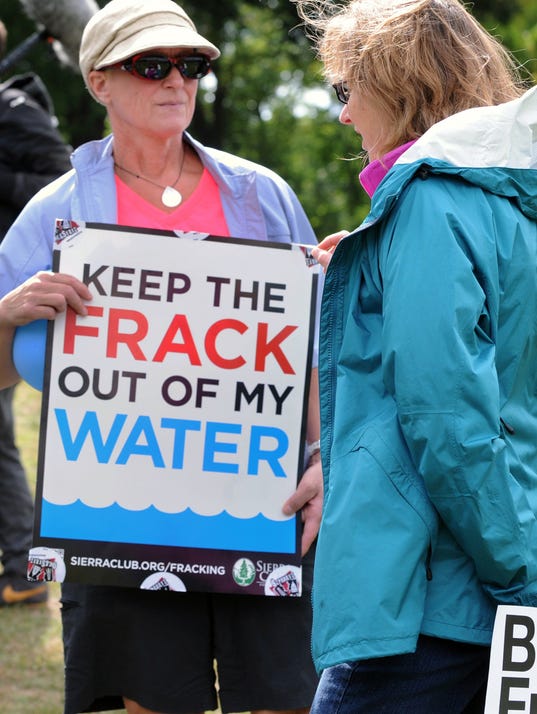Ohio: Shale drillers must report chemicals locally
COLUMBUS — A list of toxic chemicals used by Ohio shale drillers must be made available locally to governments, first responders and residents under a new state directive.
Ohio officials notified companies that a federal chemical disclosure law trumps a 2001 state law requiring that the information only be filed with the Ohio Department of Natural Resources, The Columbus Dispatch reported Monday.
The state gave companies until Sept. 21 to begin complying with the federal law.
The guidance affecting the state’s burgeoning hydraulic fracturing industry follows an April letter in which the U.S. Environmental Protection Agency made clear that Ohio’s chemical-reporting laws don’t supersede federal right-to-know requirements.
The letter came in response to a complaint by a coalition of environmental and community groups involving a January chemical emergency near St. Marys in Auglaize County.
Associated Press review of complaints casts doubt on industry view that it rarely happens.
PITTSBURGH (AP) — In at least four states that have nurtured the nation's energy boom, hundreds of complaints have been made about well-water contamination from oil or gas drilling, and pollution was confirmed in a number of them, according to a review that casts doubt on industry suggestions that such problems rarely happen.
The Associated Press requested data on drilling-related complaints in Pennsylvania, Ohio, West Virginia and Texas and found major differences in how the states report such problems. Texas provided the most detail, while the other states provided only general outlines. And while the confirmed problems represent only a tiny portion of the thousands of oil and gas wells drilled each year in the U.S., the lack of detail in some state reports could help fuel public confusion and mistrust.
Foul tap-water odors, flavor persist
Columbus water officials are baffled by lingering foul odors and flavors that have some residents apologizing to out-of-town guests and area restaurants warning customers.
Officials blame algae and organic materials stirred up when seasonal temperature changes roiled Hoover Reservoir. The reservoir serves about 500,000 city and suburban water customers north of I-70 through the Hap Cremean Water Plant.
The water is not harmful, city utilities spokeswoman Laura Young Mohr said yesterday. The city has received about 1,000 complaints since mid-November, she said.
“It smells like creek water and tastes so bad that you have to spit it out immediately,” said Jane Starcher, a North Linden resident. “Who wants to shower with water that is smelly?”
The AP found that Pennsylvania received 398 complaints in 2013 alleging that oil or natural gas drilling polluted or otherwise affected private water wells, compared with 499 in 2012. The Pennsylvania complaints can include allegations of short-term diminished water flow, as well as pollution from stray gas or other substances. More than 100 cases of pollution were confirmed over the past five years.
Just hearing the total number of complaints shocked Heather McMicken, an eastern Pennsylvania homeowner who complained about water-well contamination that state officials eventually confirmed.
"Wow, I'm very surprised," said McMicken, recalling that she and her husband never knew how many other people made similar complaints, since the main source of information "was just through the grapevine."
The McMickens were one of three families that eventually reached a $1.6 million settlement with a drilling company. Heather McMicken said the state should be forthcoming with details.
Over the past 10 years, hydraulic fracturing, or fracking, has led to a boom in oil and natural gas production around the nation. It has reduced imports and led to hundreds of billions of dollars in revenue for companies and landowners, but also created pollution fears.
Extracting fuel from shale formations requires pumping hundreds of thousands of gallons of water, sand and chemicals into the ground to break apart rock and free the gas. Some of that water, along with large quantities of existing underground water, returns to the surface, and it can contain high levels of salt, drilling chemicals, heavy metals and naturally occurring low-level radiation.
But some conventional oil and gas wells are still drilled, so the complaints about water contamination can come from them, too. Experts say the most common type of pollution involves methane, not chemicals from the drilling process. thank you battleskin88
Fracking wastewater lagoons the size of football fields could dot eastern Ohio as state officials draft rules for the storage sites.
Oil and gas drillers use the lagoons to store millions of gallons of water contaminated with fracking chemicals, toxic metals and radium that come up from shale wells. Companies clean the water of pollutants so it can be recycled to frack new wells.
“We are putting in a process to outline their standards of construction and their length of use,” said Mark Bruce, spokesman for the Ohio Department of Natural Resources.
A provision in the most-recent state budget requires Natural Resources officials to create rules and permits for them. Similar lagoons are common in Pennsylvania and West Virginia.



No comments:
Post a Comment